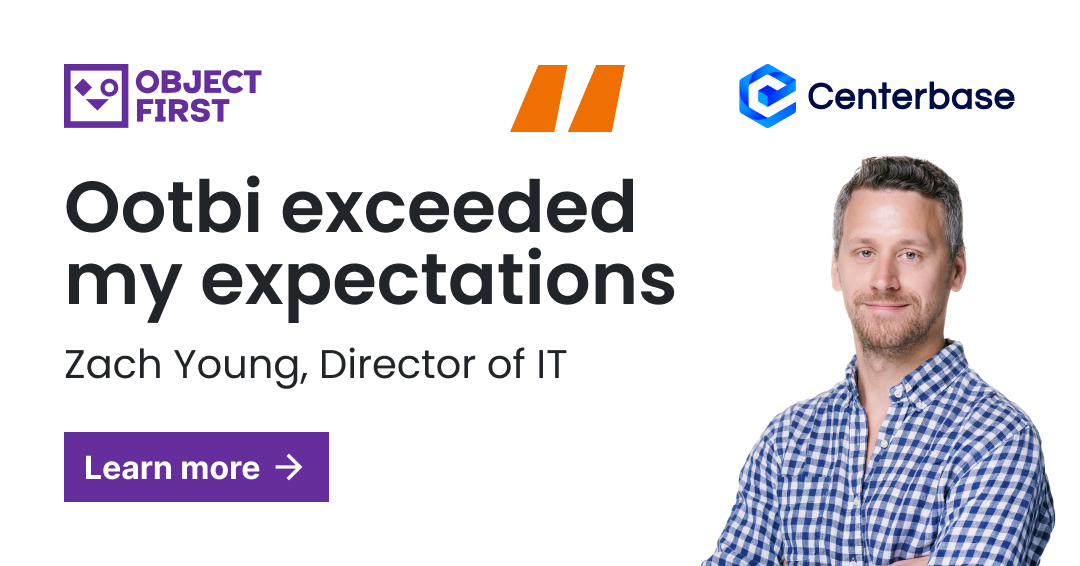Data Backup for Business: Everything You Need to Get Started
Data is an essential asset for every business, no matter the industry or size. But with ransomware attacks taking place every 11 seconds—and 96% focussing on backup data—data loss is a huge threat.
While all businesses suffer from the threat of data loss, small to mid-sized businesses are most exposed to the worst consequences: the National Cybersecurity Alliance says 60 percent of small businesses that experience significant data loss are forced to close within six months.
In this guide, we’ll discuss how businesses can avoid catastrophic data loss by understanding, planning, and implementing effective backup solutions, whatever their size.
What is Data Backup for Business?
Data backup for business is a process which involves creating copies of digital data and storing them in separate locations to keep them safe. Think of it as a kind of insurance for your digital assets.
Creating backups ensures businesses can continue operating in the case of data loss, as they can simply restore from data backups located elsewhere.
Why Small and Mid-Sized Businesses Need Data Backup
Small, medium, and large businesses all face a range of threats which make data backup necessary:
-
Ransomware: The growing risk of cyber-attacks—especially ransomware—sees many businesses at risk of having their data held hostage. Data backup allows businesses to overcome ransomware attacks and ensure rapid recovery.
-
Accidental deletion: Accidents happen, but without adequate backup storage, small mistakes can result in permanent data loss.
-
Technological failure: Backups allow businesses to recover quickly in the case of technological failure, be it hardware or software.
While all businesses face similar threats, the potential impact on smaller businesses is greater, because they often lack the knowledge, personnel, and systems to effectively combat them. This makes data backup for small business particularly important.
Ultimately, data backup is essential because it not only allows enables business continuity in the case of an incident, but it also builds trust with customers—who can be sure their data will remain safe, no matter what—and allows businesses to fulfil ever-growing compliance requirements.
5 Steps to Create an Effective Data Backup Strategy for Your Business
The process of creating an effective data backup strategy is made up of six key steps:
Step 1: Identify Critical Business Data
To figure out what you need to back up, you need to decide what data is critical to your business function.
Critical data may include things like:
-
Financial information related to accounting, reporting, and compliance
-
Customer data needed to maintain contact and continue service delivery
-
Legal documents like intellectual property and business agreements
-
Strategic documents including short and long-term business plans
Step 2: Locate critical business data
It’s no good knowing what data is critical to your business if you don’t know where it is. Data can be stored in a variety of locations within your business, including:
-
Local machines
-
Servers
-
Cloud platforms
Once you’ve located your data, you can start to determine where and how your data should be stored.
Step 3: Choose the Right Backup Solution
The size and complexity of an individual business has a direct impact on which backup solution is most suitable. The most common options today are local, cloud, and hybrid backups:
-
Local backups: Make use of external hard drives, Network Attached Storage (NAS) devices, or other devices held locally to ensure rapid access. Local backups cannot be accessed without a physical connection to the device, but they can be vulnerable to theft and physical damage.
-
Cloud backups: Utilize cloud storage services to hold data off-site. While cloud backups scale easily and ensure data is accessible from anywhere, they are expensive on a large scale, often provide slower restore speeds, and cannot be accessed without an internet connection.
-
Hybrid backups: Combine both local and cloud to benefit from the advantages of both options—offering the speed and security of local storage with the flexibility of cloud storage. The greatest benefit is redundancy, ensuring data is always available if either cloud or local backups fail.
Step 4: Backup scheduling
Your data is only as secure as your last backup. As part of your data backup strategy, you need to decide how often backups should be to ensure you always have a copy of your most important data.
Backups can be automated for ease of use, but it’s important to perform them regularly to reduce the risk of data loss.
Most businesses choose between:
-
Daily backups: ideal for businesses that generate large amounts of data
-
Weekly backups: suitable for businesses that create moderate amounts of data
-
Real-time backups: best for businesses that can afford minimal data loss
Step 5: Encryption
To prevent unauthorized access, data needs to be encrypted both during transfer and when at rest. This protects confidentiality, but it also makes it harder for malicious actors to access, steal, or hold your data to ransom.
Step 6: Testing & Monitoring
Backups require regular testing to ensure they can actually restore your data effectively in case of an incident. Conducting testing often allows you to identify any issues or failures, and optimize any processes that aren’t working as well as they should.
Takeaways on Data Backup for Business
The points above offer an overview of what your data backup strategy should include, but they’re not exhaustive.
Ultimately, your specific business data backup strategy will depend on the needs of your individual organization. A trusted partner can be invaluable in helping you assess your business’ requirements (and the right potential solution).
Business Backup and Recovery Done Right: Case Study
Having a strategy in place for business backup and recovery is one thing—implementing it is another. Here’s an example of how one nonprofit healthcare consortium overcame its critical infrastructure challenges with the right backup storage solution:
North Country Healthcare
With over 1,000 providers and support staff, North Country Healthcare provides locally accessible healthcare to the residents of northern New Hampshire.
Challenge
-
Sub-par security: a lack of advanced security features put data at risk of deletion or alteration
-
Excessive complexity: a complex management experience wasted valuable business time
-
Inconsistency: monthly patching put primary backup storage briefly out of service, while system health checks often delayed backup jobs
Result
To overcome these challenges, the consortium partnered with Object First. Their Ootbi (Out-of-the-Box Immutability) appliance ensures recovery with secure, simple, and powerful backup storage for Veeam customers:
-
Next-level security: immutability keeps NCH’s data ransomware-proof, while adherence to ZTDR principles minimizes the risk of data breaches and unauthorized access—fulfilling internal security initiatives.
-
35% shorter backup window: allows Veeam to replicate NCH data offsite more quickly
-
Increased speed: on-prem Ootbi mitigates the speed limitations of cloud storage
-
Lower overheads: simpler processes as well as updates pushed directly from Object First streamline management
Download the case study and learn how exactly North Country Healthcare achieved compliant backup storage with Object First.
Best Practices for Maintaining and Optimizing Business Backup Strategy
Maintaining the security of your data backups doesn’t end with your data backup strategy. Below are a few additional best practices to make sure your data backups remain safe in practice, not just in theory:
Reviews
Your business needs—and data usage—will naturally grow and change. It’s important to regularly review your backup strategy to ensure it continues to provide the best protection possible.
Training
Employees play a vital role in maintaining the safety of your data. It’s important they’re trained in best practices around data backup to ensure your data remains safe.
Documentation
When an emergency happens, clear documentation is vital. It ensures anyone—and everyone—knows exactly what to do to restore data quickly and safely.
Compliance
Data protection regulations continue to grow more stringent. Ensuring your backup strategy complies with all relevant local laws will not only prevent legal issues, it also certifies that your data is genuinely secure.
External help
Data backup strategies are complex, and it’s understandable to not know everything. External IT experts—like managed service providers—are an excellent way to make sure your backup strategy fulfils all necessary requirements and can stand the test of time.
On-premises vs Cloud Backup Solutions for Business
There are two key data backup solutions for business: on-premises and cloud. Making a choice between the two requires weighing the advantages and disadvantages of each.
While cloud backups may scale easily and guarantee data is accessible from anywhere, they are costly, slower, and require an internet connection to access.
On-premises backups may be more vulnerable to theft and physical damage, but they don’t require an internet connection and are more difficult to access as a result—making it more difficult for cyber-attackers to commit destructive actions.
However, not all on-premises solutions are equally safe. If backup storage data can be overwritten by a backup or storage admin, a vendor, or an attacker, then the data is not immutable, meaning it can easily be overwritten or destroyed. This makes the device a perfect target for ransomware.
Ootbi (Out-of-the-box Immutability) by Object First is ensures recovery with secure, simple, and powerful backup storage for Veeam customers.
Ootbi: The Best On-premises Storage for Business Data Backup
Your backup data is only as safe as your data backup strategy and storage solution. Compromising on either puts your data—and the survival of your business—at risk.
Fortunately, you don’t have to compromise.
Ootbi by Object First ensures recovery with secure, simple, and powerful backup storage for Veeam customers that can be racked, stacked, and powered in 15 minutes while providing unbeatable backup and recovery performance.
Find out why Ootbi is the Best Data Backup Storage for Veeam, whatever your business size:
FAQ
Q: Why is data backup important for businesses?
A: Data backup acts as an insurance policy, ensuring businesses still have a copy of their data even if they lose access to their primary data source. Without a backup, any data loss is likely to result in significant disruptions to business operations.
Q: What are the three types of data backup?
A: Primary backup methods include local backups (such as external hard drives or NAS devices), cloud backups (online services), or a hybrid approach which combines elements of both.
Q: What is the best way to backup data for a small business?
A: The best approach is whichever fulfils a business’ individual needs. However, all backups should follow the 3-2-1 backup rule as a standard—and should be regularly tested to ensure they work effectively.
Q: What is the best solution for business data backup?
A: The ideal backup solution features immutability—meaning data can never be altered, overwritten, or deleted by backup or storage admins, vendors, or attackers. Object First’s Ootbi appliance is ransomware-proof and immutable out-of-the-box, ensuring recovery with secure, simple, and powerful backup storage for Veeam customers.
Reference


